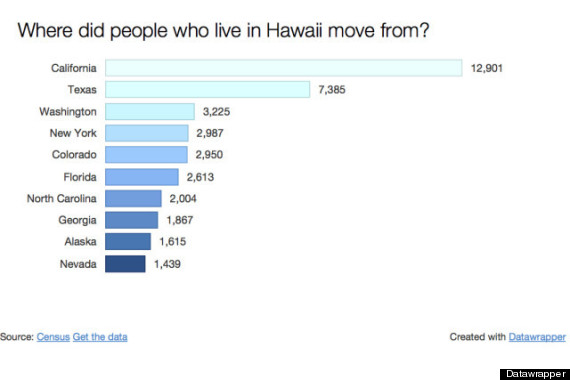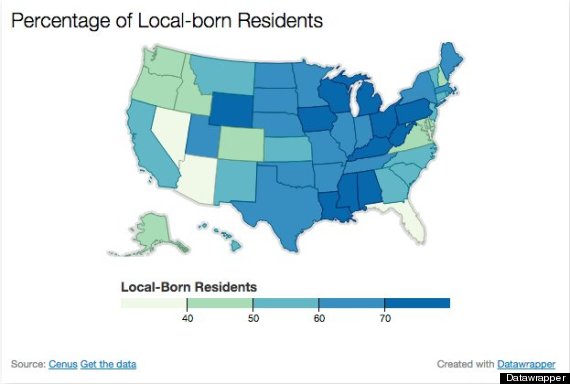You eat Spam musubi. You call your elders “Auntie” or “Uncle.” You leave your slippers at the door wherever you go.
People in Hawaii talk a lot about what it means to be “local.” Maybe that’s partially because so many of us came from somewhere else.
According to U.S. Census data, only 54.2 percent of people who live in Hawaii — including the military population — were actually born here. In most states, more than 60 percent of the population was born there. More than 75 percent of Louisiana, Michigan and Ohio residents were born in the states where they currently live.
Since barely more than half of us were born here, it might seem easy to ignore all that “local” talk.
The satirical TV show “South Park” lampooned it. “Our ancestors sailed here! On a cruise ship! Nine months ago!” deadpanned one character staking a claim to deep island roots in the “Going Native” episode.
But not everyone is laughing.
“Every few years, it seems like the media does an article about local identity or culture,” UH Ethnic Studies Professor Jonathan Okamura said. And most of these articles tend to simplify local culture down to whether you eat shave ice, he said.
As for the Census statistics, “being local does not mean that you were born and raised here,” Okamura said.
“If you have this appreciation of Hawaii, the land here, the people here and the cultures here, that’s what makes people local.”
“I think (being local) means spending a significant amount of time in the islands so you’re rooted in the community,” said Ty Tegan, chair of the University of Hawaii’s Ethnic Studies Department.
Tegan was born in Germany to military parents who were from Hawaii. He’s part-Native Hawaiian, but spent some of his childhood in Colorado and Georgia.
“A sense of localness is one that doesn’t erase Native Hawaiian history,” Tegan said.
When we define local based on whether or not we do stereotypical local things, we lose the deeper connection that brought together Native Hawaiians and other ethnic groups during the plantation era, he said. Celebrating the relationships between those ethnic groups means more than just speaking a little pidgin.
“I see local … as how invested they are at maintaining Hawaii as a unique place,” Tegan said.


Support HuffPost
Our 2024 Coverage Needs You
Your Loyalty Means The World To Us
At HuffPost, we believe that everyone needs high-quality journalism, but we understand that not everyone can afford to pay for expensive news subscriptions. That is why we are committed to providing deeply reported, carefully fact-checked news that is freely accessible to everyone.
Whether you come to HuffPost for updates on the 2024 presidential race, hard-hitting investigations into critical issues facing our country today, or trending stories that make you laugh, we appreciate you. The truth is, news costs money to produce, and we are proud that we have never put our stories behind an expensive paywall.
Would you join us to help keep our stories free for all? Your contribution of as little as $2 will go a long way.
Can't afford to donate? Support HuffPost by creating a free account and log in while you read.
As Americans head to the polls in 2024, the very future of our country is at stake. At HuffPost, we believe that a free press is critical to creating well-informed voters. That's why our journalism is free for everyone, even though other newsrooms retreat behind expensive paywalls.
Our journalists will continue to cover the twists and turns during this historic presidential election. With your help, we'll bring you hard-hitting investigations, well-researched analysis and timely takes you can't find elsewhere. Reporting in this current political climate is a responsibility we do not take lightly, and we thank you for your support.
Contribute as little as $2 to keep our news free for all.
Can't afford to donate? Support HuffPost by creating a free account and log in while you read.
Dear HuffPost Reader
Thank you for your past contribution to HuffPost. We are sincerely grateful for readers like you who help us ensure that we can keep our journalism free for everyone.
The stakes are high this year, and our 2024 coverage could use continued support. Would you consider becoming a regular HuffPost contributor?
Dear HuffPost Reader
Thank you for your past contribution to HuffPost. We are sincerely grateful for readers like you who help us ensure that we can keep our journalism free for everyone.
The stakes are high this year, and our 2024 coverage could use continued support. If circumstances have changed since you last contributed, we hope you’ll consider contributing to HuffPost once more.
Already contributed? Log in to hide these messages.



